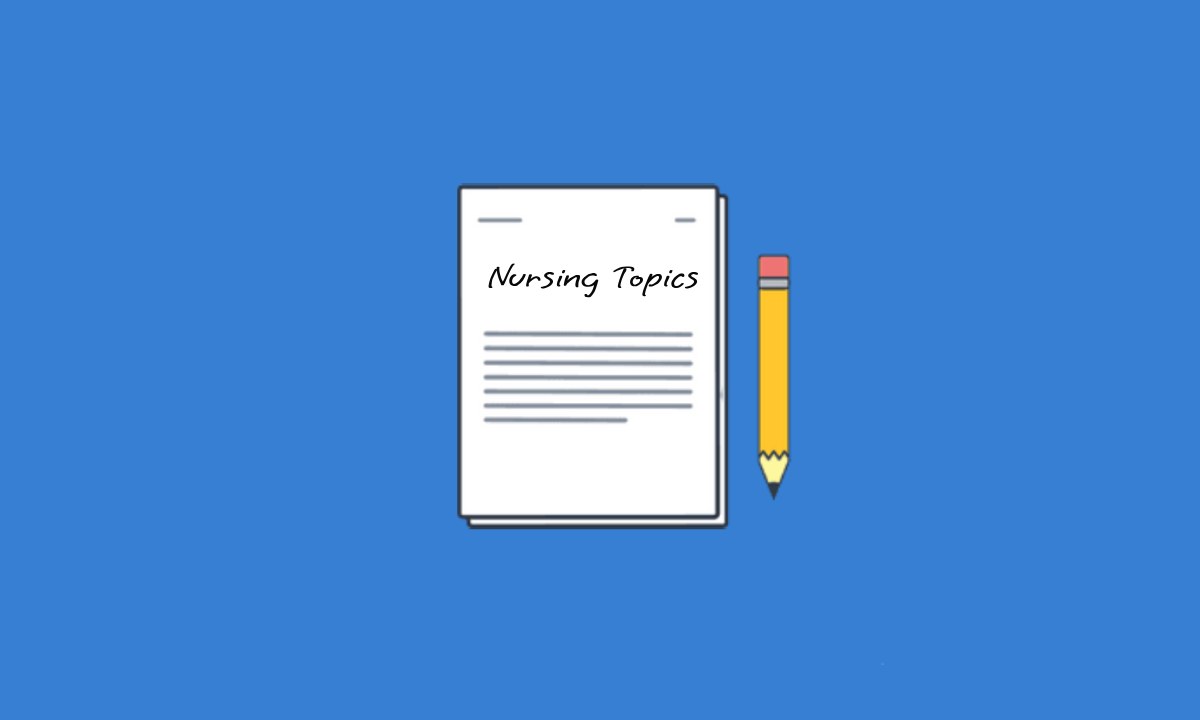Here are several examples of titles and ideas for research projects in both a qualitative and quantitative approach to a nursing thesis.
Examples of Research Topics for Nursing Thesis :
- Mentoring in nursing – This thesis analyzes students’ experiences before, during, and after.
- Nursing care and palliative skills associated with it – This theme defines palliative care and shows its importance in long-term patient care, as well as a summary of its objectives for the patient and his / her family and/or loved ones.
- Intuition in the nursing profession – In this topic, you basically dive deep into Shon’s theory of reflection and its role in making clinical decisions in practice.
- Burn-out in the nursing profession.
- Proposal of an initiative for adolescent youth in terms of stress prevention.
- Case study on pain management in pediatric nursing.
- The measures that should be taken when the elderly refuse to eat.
- The management of serious cases of time.
- Techniques for the treatment of the feet of diabetic patients.
- Nursing through non-verbal communication.
- The stress factors in nursing practice.
- The cooperation in the profession between the different actors.
- HIV care and the changes that have occurred in recent years.
- Return to work after an absence.
- Change the view of the public of the profession.
- The care of the elderly.
- Importance of the family in the treatment of adolescents with eating disorders.
- Mental health and poor housing.
- Procedures to follow in the treatment of a mental patient.
- Listen to a mentally ill detail his / her problems. Help?
- Educate the population about the importance of a healthy diet. What procedures can be used?
- Relationship with the patient. Does it lead to better recovery?
- What kind of therapy is best for the elderly?
- Alzheimer’s disease and the problems encountered by the spouses of the patients.
- Therapy of laughter and its effects.
- How nursing theories are useful in making decisions in clinical trials.
- What are the holistic practice of nursing and its practice with the help of the McGill Model of Nursing
- The Neuman systems model and how it is useful in determining nursing interventions in public health matters.
- How efficient is the conceptual nursing model
- What is the importance of reflection in nursing practice, as well as nursing theory
- What are the perspectives of the different theories of nursing and how they are useful in the practice of nursing
- The application of the Logan Ropar Tierney model in nursing practice and how it helps in case there is an emergency situation.
- What is the best nursing model that each student should follow
- How Ropan Logan Tierney model can be applied in the case of treatment and proper care of psychiatric patients; Nursing thesis .
- The problem of the shortage of nurses and how to deal with this problem.
- The amount of stress even experienced nurses face in their career
- How to fight against breast cancer
- The role of nurses in the treatment of patients with mental disabilities
- What should be the work ethic of nurses
- Why people prefer to have home-based nursing services after getting admission to the hospital
- What it takes to leave your profession as a nurse and rejoin after a long period
- The effects of advances in technology in the nursing industry
- The salaries that nurses receive are not enough to justify their workload
- Increased competition among registered nurses and recent graduates trying to get a long-term job
- The importance of education and development programs for nurses at work
- The role of effective communication skills as a nurse in the understanding of patients
- The role of non-verbal communication in the development of a bond with patients to go through severe pain and disease
- Methods to improve the efficiency of nurses in the community
- The relationship between personal development and spiritual recognition as a nurse
- Problems and risks in the clinical management of patients with prostate cancer.
- New guidelines in the management of patients in intensive care units for adults.
- The perception of management problems in the care of elderly patients.
- Optimal management strategy for the patient with post-traumatic stress disorder.
- Results of the management and treatment of acute ischemic stroke.
- Clinical management and psychosocial treatment of drug dependence in prisons.
- Patients’ self-assessments and decision-making: Management approaches in surgical cases.
- Management and care strategies for patients with chronic and acute pain.
- Possible interventions in the clinical management and control of infectious diseases.
- The clinical management of hospitalized patients with cardiovascular diseases and arterial hypertension.
- The evaluation of the impact of health promotion interventions on public health in the United Kingdom.
- The contamination of drinking water in developing countries and its effects on public health.
- The evaluation of the consequences for the health of the population affected by natural disasters.
- AIDS and its social impact: A study conducted in public health.
- Exercise habits and their relationship with the epidemiological patterns of cardiovascular risks.
- The importance of a public health policy for the control of obesity in children.
- Poverty and its role in childhood diseases a public health problem.
- Public health responses and approaches to cancer prevention.
- Diabetes as a public health problem and associated lifestyle interventions.
- The care of elderly outpatients and community nursing services.
- Assessment of the nutritional status of children as an essential part of community nursing.
- The provisions for integrated community nursing services and their impact on individual health costs.
- Promotion of health through the practice of community nursing.
- The collaborative functions of doctors, nurses, social workers, and policymakers in a community nursing center.
- The use of community nursing services by patients after surgical procedures.
- The role of community nursing in improving the quality of life of the elderly.
- nursing community for the care of the elderly suffering from chronic diseases.
- A comparative study of community nursing and health care needs in different cities.
- An evaluation of community nursing services available for pregnant women and newborns.
- The role of the midwife in high-risk pregnancies.
- Support nurse-midwife intervention team in the management of cesareans.
- Model of care followed in standard delivery practice within the United Kingdom.
- The improvement of pregnancy outcomes and care with the help of midwives.
- Do midwives influence decision making and facilitate informed decisions in pregnant women?
- Factors that affect the competence of midwives in a clinical setting.
- Descriptions and perceptions of pregnant women with substance abuse problems.
- Risks to women’s health due to postpartum depression and the role of the midwife.
- The long-term effects of social support and obstetric support during pregnancy.
- Attitudes towards the confidentiality of patient information among midwives in the United Kingdom.
- Evolution of funds for research by the National Institutes of Health.
- The focus on public health policies in the United Kingdom as outlined by the Department of Health.
- The policies and approaches of the World Health Organization in the understanding of child development.
- Efficacy and efficiency of the National Health System in the provision of services to the elderly.
- Research, development and strategic policies towards healthcare as followed by the NHS.
- New organizational orientations in health care, policies, and services.
- The extension of the WHO focuses on the health needs of developing nations.
- The dynamics of organization, culture, and power within the National Health Service.
- Perspectives of strategic management of international health organizations.
- The costs and health plans of countries around the world: a report.
- The implementation of evidence-based practice as models for change.
- Leadership and ethics in the practice of nursing based on evidence.
- Evidence-based guidelines for the promotion of quality health.
- Evidence-based practice as a theoretical and practical approach. nursing interventions
- The use of evidence and the implementation of evidence-based practice.
- The role and importance of reflection in evidence-based practice.
- A study on the effectiveness of evidence-based practice in healthcare.
- Disease management with the use of evidence-based medicine.
- From the evidence-based nursing program for health needs of elderly cancer patients.
- Knowledge management in clinical practice and the use of tests.
- Air pollution and lung diseases among the urban population in large cities
- Environmental chemicals and adverse effects on the reproductive health of humans
- The evaluation of environmental health risks caused by nuclear waste
- Health hygiene in developing countries and the consequences on environmental health
- Arsenic prevention and lead poisoning: A study conducted on environmental health
- Changes in heart rate due to exposure to passive smoking – an environmental health problem
- Food poisoning and food-related diseases in different cities – Benefits of knowledge of the main risks to the health of the environment.
- Participation of the community and the role of citizens in the development of awareness on environmental health issues.
- Methods for the prevention of work-related injuries and illnesses.
- The relationships between safety at work, stress, and the health of workers.
- The use of effective health interventions to make the workforce.
- The management of occupational health and safety needs of workers in the pharmaceutical industry.
- Occupational health concerns in a global economy and increased work pressure.
- Aspects of health and safety at work among the workers of the factories.
- The growing need to realize the problems of health and safety at work in industrialized societies.
- Psychology of occupational health and interventions in stress management.
- The organizational initiative of a global company (Glaxo) to guarantee occupational health and safety in the workplace: A case study.
- The long-term consequences of occupational stress among police forces.
- The efficacy of psychiatric treatment and medicines for schizophrenic patients.
- Assist the mental health needs of older adults suffering from depression and loneliness.
- Youth and adolescence problem of alcohol and drug use and its relation to mental health.
- Understanding the mental health needs of women victims of sexual and physical abuse.
- A comparative study of mental health problems in urban and rural societies.
- Stress and mental illness among gays, lesbians, and bisexuals, due to social pressures.
- Unemployment as a factor of aggravating mental health problems.
- Socioeconomic levels of individuals and evidence of mental illness.
- The link between mental illness and suicide in the urban youth population.
- The understanding of the legal aspects of mental health research.
- The perspectives of nursing theories as used in nursing practice and interventions.
- The application of nursing theories in clinical decision making.
- The Roper Logan Tierney model and its application in nursing practice, taking into account a case study of an emergency patient.
- Understanding the practice of comprehensive nursing with the McGill Nursing Model
- The study of the role and importance of nursing models and theories in clinical interventions, and the effectiveness of conceptual models in nursing practice.
- A comparative study of the Neuman model systems, Roper Logan Tierney model, and the McGill model of nursing.
- Functions of nurses and nursing models considering the changing needs of medical and nursing care.
- The importance of reflection in the theory and practice of nursing.
- Public health nursing interventions using the Neuman systems model.



